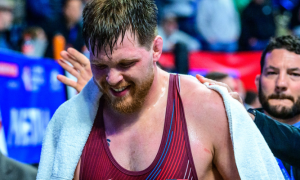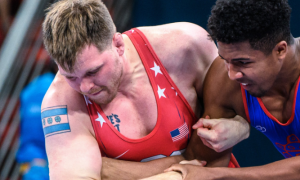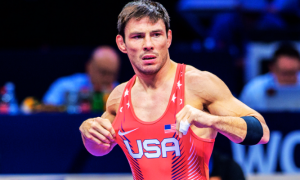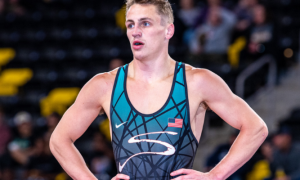Some coaches are just special.
What makes Illinois’ Bryan Medlin stand out cannot be adequately explained by pointing at all of the wrestlers he has worked with throughout the years, those battles at the National Duals, or the list of placewinners he helped guide to Fargo success. If that were the case then this would be rather easy. A quick glance at a stat sheet, a couple of niceties, and we’d call it a day. No, like any coach who is worth his or her salt, Medlin is about much more than the action on the mat. To him, wrestling is character development. Achievement means something, but it is what those achievements represent which result in his satisfaction. Young men, equally impressionable and defiant as they tend to be, require advocacy as much as structure. They need to know the man who is attempting to motivate them beyond their self-imposed limits cares for them deeply and understands the cost. After all, that freight is paid by all involved.
Medlin the Marine; the National-caliber competitor who was part of the inaugural class of the then-United States Olympic Education Center; the MMA fighter — they’re all still inside of him. When necessary, he can call upon his own body of work and relay hard lessons learned. Such is the practice of a coach. He carries core values that are at this stage, ingrained in his DNA. Medlin doesn’t have to guess what the right thing is. This isn’t someone who has to peer in their pocket to read a moral compass too often. The reason why his kids have traditionally performed well and why they continue to is because they believe him. They believe him when he opens his mouth and they believe him even more when they discover their own ability to overcome obstacles. Just like he urged them they could.
Now rolling in is another Fargo Nationals, the one week of the summer, if not the entire year, where it’s perfectly fine that Greco-Roman wrestling is part of the American wrestling mainstream. We’ll take it. So will Medlin. As one of the country’s most respected voices in Greco-Roman, he is aware of the issues facing the classical style in the US. The battle for the hearts and minds, an ongoing struggle that follows coaches like him through all waking hours, is accepted. What isn’t is ignorance. Laziness. Blinders. Part of what makes wrestling so important to Medlin is that it’s an all-inclusive proposition. He coaches his youths that way and it is where he feels Greco-Roman sometimes misses the mark. Medlin wants to educate. He wants to impart his passionate wisdom. But even he can’t do it alone.
So what you have here is a man, a highly-influential man, who strives to be better that way his wrestlers can be. Who wants to grow the sport not just because he loves the competition, but also the desire for improvement that results from it. However it has to happen — in a giant arena filled with hopeful wrestlers or an impossibly-humid wrestling room with just a handful of workout partners. Countless athletes have wanted Bryan Medlin in their corner and it really doesn’t take you too long to figure out why.
5PM Interview with Bryan Medlin
5PM: We spoke with Coach Powell, a man you’re often linked with by some of our more successful Senior competitors from Illinois. You’re still young, but you’ve had such an impact on so many accomplished guys. Do you ever take a step back and at least acknowledge or appreciate your influence? Or is constantly always about the kids you have now?
Bryan Medlin: No, I don’t think I’ve ever stepped back and said, Wow, look what we’ve done here. It has been more along the lines of the fact that I appreciate I have been able to have the chance to be involved with these kids. To be honest, it has been one of the best experiences of my life, to be able to coach with Coach Powell and the other great coaches I’ve been able to sit in the corner with, brainstorm practices with, whatever. It has been a great experience for me. It has shaped the way I raise my children, it shapes the way I view my wife and my family relationships, and things like that. It’s such a big part of who I am that I couldn’t really imagine not doing it and at the same time, not trying to do our best.
The kids who we’ve had come through the system, they’ve gone on and done some great things, and yeah, I’m proud to say that Illinois has had some pretty good wrestlers and they will continue to create those wrestlers. But for the most part, the Max Nowry’s, the Joe Rau’s, the Ellis Coleman’s, they are great people. And they were fun to be around and they motivated you as a coach. Not just as a coach, but to be a better person. To have more integrity and to work harder at your job because you knew that they were watching you and you wanted to be good for them. So I don’t think of myself as somebody who has maybe done a lot. I think of myself as being extremely blessed to be motivated by these great human beings.
5PM: You were a Marine, you were on the All-Marine Team, so let’s go present-tense for a second. The Marine team has hit a surge, there is a lot of great talent and great leadership from Coach (Jason) Loukides. That must make you feel pretty good, to see that. There has always been tough competitors from the Marines, but it is different now. It’s a rising team with a lot of depth and resources. I would think that is something you probably pay attention to.
BM: Oh yeah, for sure. I mean, when we get further away from our conflict overseas…as a Marine you’re told, even as a wrestler, that you’re a rifleman first, you’re a wrestler second. So when we are heavily involved in a conflict overseas you’re going to see a different Marine Corps program for however many years. For the past 15 years, we have seen that. But recently, going to the Universities and the US Open, it’s a sense of pride. Not just because they are wrestling for the same organization I happened to wrestle for at some point, but the fact that they’re people who ultimately are serving their country while having this great responsibility to them and at the same time, are doing a great job representing the Marine Corps in competition. Yeah, it’s exciting to watch. It’s like anything else, they have momentum right now. They have the spark and they have guys who looked really good at Universities, some of the younger kids, and hopefully they can keep that spark going and keep growing and making it into what it once was in the early-90’s.
5PM: How did your experience as a Marine and as a wrestler for the Marines shape your career as a coach? I imagine there are old lessons that continuously pop up even now. But just starting out as a coach and taking command of a team, not everyone can do that. How did you draw on that military experience?
BM: I think ultimately, when we are inside of the program, any of the lessons that I learned that were Marine Corps leadership skills, those were obviously very important. They shaped the way I viewed any job. When you look at the different things, such as being a Non-Commissioned Officer in the Marines, you take over a platoon, you look for the right kind of people to put your faith in, put your trust in, or you can’t get to work. It’s the same aspect. I think more than anything, the Marine Corps shaped me in a way to where I don’t have to think about it anymore. Honor, I try to make it a big part of my life. Discipline, I try to make it a big part of my life. Commitment, I try to make a big part of my life.
If you do those things, they are the pillars of what you view as your core value system, such as leading people, being part of programs and being able to follow correctly. Obviously, they give you tools and things like that. But for the most, they shaped me into a person capable of leading and capable of following, because I do think you have had to follow at some point in order to be a good leader. You can’t just go in and be a person who didn’t listen to anyone to all of the sudden, I’m going to lead this program, this company, or whatever it is. So I think having gone through the trenches for two years shaped me in a way to where I was able to take advantage of it once I was given the chance to do something.
5PM: What is, if there is one, the secret to finding common ground with kids from varying backgrounds and being able to communicate not only wrestling technique, but those intangibles like focus, dedication, sacrifice, what have you? Do different kids need a different voice or is it all about a unifying message?
BM: Yes, for sure, different kids need a different voice. Not all kids come from the same background and have the same socio-economic status, the same parental support. Kids need a different approach, but the message has to be the same. The message has to consistently be, You’re about to embark on something that is great, that is going to be rewarding to you. Something that 50 years from now you will be able to remember how you did this great thing you had to struggle for. Kids will buy into that. I mean, I buy into that as a human, and most of the people I know can buy into something that is going to be rewarding.
That’s the big thing. Wrestling is a great sport, it teaches you all of these different values you can create your own system with and all the rest. But for the most part, this is a rewarding experience. If you struggle and you go through the process and you came out the other side, and you gave your best whether you were successful or not successful, it’s a rewarding event. It’s something that isn’t going to pass daily. It’s not some enjoyable little thing like playing Xbox or going fishing, or whatever those little minor things are that are fun at the time. It’s becoming something they can hopefully take with them their whole lives.
5PM: Fargo is an all-encompassing event. It has become so grand in scope, it’s age-group wrestling’s national holiday in this country practically. As a coach who has sent countless athletes to this event, what is the one thing you actually caution them about when it comes to the competition itself?
Bryan Medlin: Don’t look ahead. Just do what the next right thing is. Whatever that is. There are going to be a ton of them and they are all going to shift from this to that. Whether it is looking ahead in your bracket or looking ahead at what you have to weigh tomorrow morning, just concentrate on doing whatever it is you’re doing at that time to the best of your abilities.
We’ve had some success and I know you had Joe Rau on. When he was a senior, he wasn’t highly-touted. He was a good kid, he loves wrestling, but at the same time, I can remember having the radio — Joe Rau beats this guy, Joe Rau beats that guy — he was beating ranked guys in the country and he was in one of the hardest brackets in the tournament. And I remember talking to him later on after the situation and he said, “Hey Coach, do you know what I did for the first time ever? I didn’t look at the bracket. I just saw what color I was and went out and wrestled.” That kind of just hammers home to our guys, Don’t look ahead. Just look at as, I have to do this next thing, whatever that is, and put all of your effort into that. Don’t just get good. Don’t just coast through it and try to get through making weight. Make it perfectly. And then after you get done, don’t just eat something. Eat exactly what your body needs at the time. Don’t just go to bed when you feel like it, go to bed and make sure you rest up perfectly. Make sure your warm-up is perfect. Make sure your mental preparation for each match is perfect.
Do every little thing right because there is a pretty good percentage that it is not going to work out. You’re going to go through this process and do all of this work, go to camp, and do all of these things, and it’s not actually going to work out. There’s a very good chance, so you want to be able to say in two weeks or whenever you leave camp and you’re riding back on the bus, that you did everything possible. You did everything you could in your power, and that’s an okay feeling. I’ve seen both sides of that coin. I have seen guys who gave heroic efforts and didn’t succeed, and they feel okay about themselves. I think the one time it actually becomes a real loss and Fargo becomes a negative place is when you know there is something you could have done better and it didn’t work out for you. As long as you can control what is within your reach, you’re going to be satisfied, and that’s what you want to be at the end of the day.
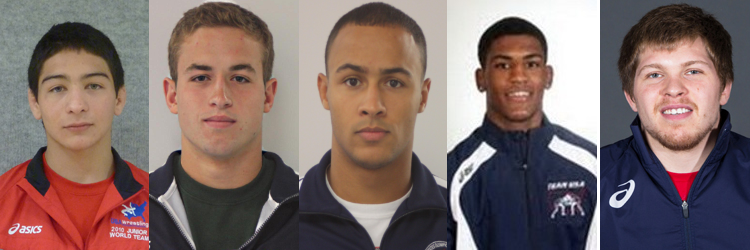
MEDLIN-COACHED: (from left) 2012 University World Champion Max Nowry; 2015 Junior World Team member Travis Rice; 2016 Senior World Team member Chris Gonzalez; Two-time Junior World Team member, two-time Senior World Team member, & 2012 Olympian Ellis Coleman; 2014 Senior World Team member & 2016 Olympic Team Trials Champion Joe Rau. Nowry, Gonzalez, Coleman, and Rau are current US Senior National Team members (Photos: USA Wrestling)
5PM: What do you yourself look forward to the most about Fargo?
BM: I love to see kids overachieve. I love to see a kid no one has ever heard of, a Joe Rau. We’ve had so many of them over the past few years who just kind of showed up to the tournament and no one knew their names and then suddenly, they grind out a match in the semis or the quarters, or they get an upset early, or they make it to the finals. Just seeing that joy of what’s possible. That look of, Holy cow, this is the first great thing I’ve done in wrestling. They take that with them and it becomes a powerful thing, like an extra battery for them in wrestling. You see them later on and they’re still beaming about it. Maybe it implores them to go to Northern Michigan or it motivates them to go down to Williams Baptist, whatever it is.
A guy like Max Nowry had no real plans to wrestle Greco when he showed up to high school. But then to see him become motivated by his position and he sees the hard work pay off. Then he goes to Northern Michigan and is lucky enough to wrestle for one of the best coaches I ever met, get some excitement for Greco, and look at him now. He’s on that brink of doing something really great in wrestling and I think back to the humble beginnings that he had. That look on his face, I’m hopefully going to see it this weekend. That’s what I look forward to the most.
5PM: Are there any drawbacks to Fargo?
BM: A drawback would be, honestly, I don’t like how they change things from year to year. I’m not a complainer, so whatever the rules are that are in place, those are the rules and that’s fine. We’re going to make adjustments and find ways to win within that set of rules and keep teaching our core curriculum and adjusting it to whatever works out best. The drawback is from year to year, you’re not sure when weigh-ins are. It’s more of an itinerary problem. I’m not really sure what caused the switch from freestyle to Greco this year. I’m not really sure why some years we have two weigh-ins and other years we have one weigh-in. I’m not quite sure what causes these changes, but they do kind of mess up the gaining of momentum for me personally as a coach when it comes to doing things better. Because every year, it seems like I’m just trying to do the best job within a certain itinerary. So I think if they find a good system, I mean, heck, it’s been at Fargo for years and years and years. They wrestle four styles — Cadets and Juniors, freestyle, Greco, folk and you add in the women’s tournaments and everything else. I mean, we’ve been doing it long enough, we shouldn’t have a system that changes very much.
Personally, I do feel that coaches can do a better job with a given itinerary if they had that successive itinerary every year instead of changing it yearly. From time to time, you don’t really know if it’s two weigh-ins or one weigh-in, when it will be, the night before, the day before. It’s one of those things we have control over. We may not have control over forced par terre, whether we’re going to the clinch position — whatever UWW decides are the rules. That’s in their control and as athletes and coaches, we need to recognize that is within our control and do our best within the given rules.
5PM: Where do you see Greco-Roman wrestling lacking the most in this country?
Bryan Medlin: I think an overall sense of where we’re going needs to be construed and really conveyed to all of the coaches. For what it’s worth, I think Coach Lindland has done a great job of being really ambitious and really emphatic with some of the things he wants to do. But where are we going, what’s the process? Obviously, the endgame is to create Olympic champions and to take the United States back to the World Championships and win the Senior-level tournament. Because I feel like I am in Greco a lot and I’m not really sure if the emphasis is on getting young athletes, getting the next Kamal Bey or Cohlton Schultz out to the Olympic Training Center. Or is it getting the next Gabe Dean to switch over from freestyle to Greco? Or, is it a combination of all of those, trying to get as many good athletes as we can? So I’m not really sure where the focus exactly is and what the endgame is. But I think Coach Lindland is getting closer to an answer. It seems like he is. Me personally, I obviously watch from the outside and I’m not involved with the internal process or anything like that. I just think as coaches we need to communicate that a little bit better and we’re going to get there. We all know where we want to go, it’s just, how we are going to do it?
I read Twitter and a guy like Chris Gonzalez is really upset because Gabe Dean is switching over and for what it’s worth, I think it takes a lot to make a great Greco wrestler. It takes years and years and years to develop high-level par terre offense. I’ve never held a conversation with Gabe Dean, so I’m not trying to sound like I know who he is and I’m not trying to sound like I understand all of the training he is going to be doing. But I know this, and that is it’s not as simple as being ranked as one of Flo’s pound-for-pound college wrestlers and then coming into Greco and now all of the sudden, you’re a Greco guy. That doesn’t work. We have seen that for the past how many years fail and fail and fail when they try to open the Trials to any freestyle World Team Trials qualifier. They tried that a couple of years ago and freestyle guys were showing up getting their elbows snapped because they weren’t really sure how to defend a gutwrench, or they were getting thrown because they were uncomfortable in over/under’s. And then you’ve got a guy like Sam Hazewinkel who grew up wrestling Greco, his whole family wrestled Greco, and he was fine. He was wrestling in the freestyle Trials and then he wrestled in the Greco Trials and I think he made it a really close match with Spenser Mango.
So I think, long story short, would be an overall vision and a concise idea of where we’re going or how we are going to go where we all know we want to go. Because we’re all under the same assumption we want to win Olympic championships. We want the United States Greco team to be number one in the world. Now exactly what the process is to get there? You know, I realize that it shouldn’t be set in stone to where we ignore everything, have blinders on, and ignore some things that could be making us better. But in the same sense, is it the young athletes we’re going after? Is it the older ones? Are we going to have more training centers in the United States? It’s just rumors and stuff. I think those are things that we can gain some excitement with and get close to that goal of winning an Olympic title if we can kind of have everything put together.
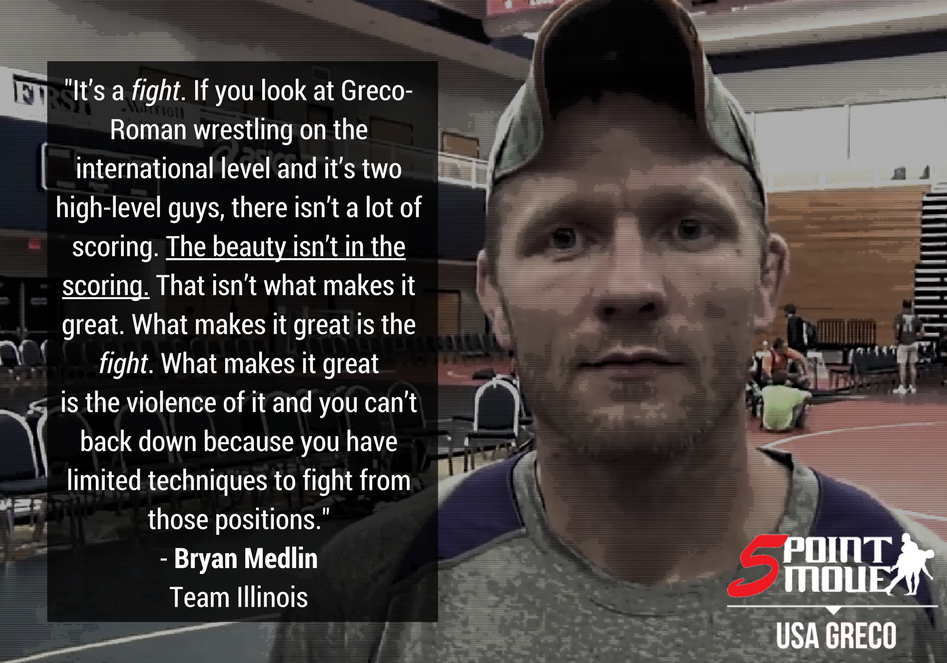
5PM: I realize your obvious success, experience and love working with high school wrestlers and developmental-age athletes, but do you ever envision or see yourself having more involvement on the Senior level? I ask this for obvious reasons. Whether you care to admit it or not, there is no doubting the impact you have had on some incredible athletes in this country. But then again if you did that, Illinois and this country as a whole would be missing out on your talent for actually developing those wrestlers for later on. But is this anything you would actually consider, or not yet?
BM: To be honest, I personally approach it like, The job right now, do it the best you can. This is what I have right now and I find it a noble profession. Would I completely turn off the idea of doing something else? Absolutely not. But at the same time, I feel like too many people get ambitious to the point where they forget they are doing a pretty noble job right now and they should do their best at that. I guess that’s the short answer of it, is no. And to go into the Illinois coaches and I hear this, that I’ve had a great impact. But I feel lucky. I feel completely lucky to have been with the coaches and athletes I have been able to be with. But for the most part, Illinois has many great coaches, many great ambassadors. I don’t feel like they get enough of the credit — especially Justin Pearch, Chris Haag, JD Oliva, Paul Collins, Mike Powell, George Kirgan, Ray Blake, Pete Kowalczuk — these guys go out all year and give up big chunks of their time and don’t get paid to do it. And I think in the end, you hear about Illinois’ success and my name gets thrown in there, Mike Powell gets thrown in there, but these guys are the ones running the ship right now. I haven’t been to the Junior Duals in four years I think, and these guys have been doing a phenomenal job at improving on our curriculum and doing a great job of getting the idea of something we had and making it even better. So I just feel very lucky to even be in the same room as some of these coaches.
5PM: This question is a little dated but I’d be remiss not to include you in on it. Do you feel folkstyle holds the US back internationally? Or do we just not do a good enough job of finding ways to use it to our advantage?
BM: I think it’s both. We do not use, Greco especially, enough for what it is. It’s a fight. If you look at Greco-Roman wrestling on the international level and it’s two high-level guys, there isn’t a lot of scoring. The beauty isn’t in the scoring. That isn’t what makes it great. What makes it great is the fight. What makes it great is the violence of it and you can’t back down because you have limited techniques to fight from those positions. I think that’s something when a folkstyle wrestler gets the idea of it, he turns hand-fighting into not just pulling a guy’s head, but destroying him. So yeah, we don’t do enough of that in the United States and taking advantage of what that is. I think personally, in the same sense, as Americans, we’re highly competitive. Anything we do, we want to do it the best and I think folkstyle has become this machine that everybody is afraid to mess with because it’s so empowering in the United States and we have all these little kids. And honestly, little kids should be wrestling folkstyle. It’s a safe style. You can’t lock your hands, you can’t slam people. A lot of the rest of the world starts off with a way of wrestling where kids can’t lock their hands because it is safe. But at the same time, you get that competitiveness in the United States and it takes you later on into your wrestling years.
I think that is something we’ve done, we have become too competitive in folkstyle and have made that the overall goal. The overall goal, make no mistake about it, is to win the Olympics. Every single thing prior to that is developmental. Every single event prior to that is just feedback. It’s just a data point. It’s just something to say, You need to do a better job at this. You need to get better at this position or you need to manage your weight, or whatever that is. Or it’s, You’re doing a good job at this, keep doing this, do this more. An Olympic gold medal is by far the pinnacle of our sport and it should always be treated that way. But I think overall, our societal competition syndrome, I guess you could call it, has kind of gotten in the way of that. For the most part, we’ve got some great Greco wrestlers right now and I would love to see what our guys are going to do in the next four years. It’s going to be exciting.
5PM: At this stage in your career, when you think about your full scope as a coach — a high school coach, a developmental coach, a leader of young men — what is it that you are most proudest of?
Bryan Medlin: I guess pride wouldn’t be a word that I would use. What I am most humbled by, when I look back at some of the things I was lucky enough to get to do, I guess being able to be around such great men, and to be able to be motivated by them, creating a person I think I can live with the rest of my life and my family can live with (laughs). I guess that’s the big thing. I guess one of the things I am most proudest to say is that I’ve walked the same wrestling mats as a guy like Mike Powell. I’ve been able to coach with Justin Pearch. I’ve been lucky enough to sit in the corner for Max Nowry and Ellis Coleman. The person they made me, that’s the thing I guess I would say I’m most proud of.
Follow Coach Bryan Medlin on Twitter to stay up to date on upcoming camp information and Illinois wrestling news.
SUBSCRIBE TO THE FIVE POINT MOVE PODCAST
iTunes | Stitcher | Spreaker | Google Play Music | RSS





